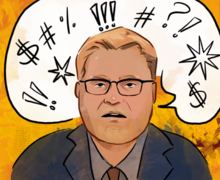National : Adams overcomes hearing impairment on hardwood
Luke Adams of Texas Tech
Luke Adams stepped to the free-throw line for the first of three shots, and the Texas Christian student section began ridiculing his floppy haircut. The fans’ chants of ‘Justin Bieber’ rained down on the Texas Tech guard and echoed throughout Daniel-Meyer Coliseum.
‘It was pretty bizarre,’ Adams said. ‘I’ve had some people joke around about it. The guys do, but never in an actual game.’
Adams didn’t let the chants faze him, though. The 5-foot-9, 150-pound freshman tackled far more adversity to achieve his dream of playing Division-I basketball after being born unable to hear from his right ear and with just 10 percent hearing in his left. During Adams’ journey to Texas Tech, he silenced doubters, proved doctors wrong and found normalcy in a lifestyle many would consider debilitating.
Adams relied almost exclusively on lip-reading before having a cochlear implant installed at age 11. The device is made of an auditory receiver deep inside his ear that is wired to an external magnetically attached transmitter system, which includes a sound-processing microphone.
‘I guess when the little guy doesn’t know he’s the little guy, he can accomplish big things,’ Adams said.
His parents, Mark and Jennifer Adams, didn’t know their son was deaf until Adams was about 2.5 years old.
Jennifer Adams thought that when Adams pulled her face close to his, he was being cute. Astoundingly, he was reading her lips.
It wasn’t until Fourth of July weekend in 1994, when Adams sprinted away at Disney World despite his parents’ frantic screams to come back, that they suspected he was hearing impaired.
A few days later, his mother had Adams face away from her before banging a pan violently behind his head.
He didn’t even flinch.
She soon took Adams to see an ear, nose and throat doctor, who administered an auditory brain response test.
‘(The doctor) said, ‘Your son is profoundly deaf,” Jennifer Adams said. ‘He said, ‘Your son will lose all his speech utterances. Your son will never use his voice. Your son will need to learn how to (use) sign (language).”
He recommended Adams attend the Texas School for the Deaf in Austin, Texas.
But they chose to fit Adams for hearing aids and hired an auditory-verbal therapist to work with him regularly. With her help, they trained Adams to listen — not lip-read — by covering their mouths while speaking.
‘I was just determined that he was going to talk,’ Jennifer Adams said. ‘I was determined that he was going to go to a regular school because he didn’t have a cognitive disability. I knew he was smart, he just couldn’t hear.’
When his family moved to Lubbock, Texas, when Adams was 6, school officials said he couldn’t join the public school system. So he enrolled at Trinity Christian Academy, where he stayed until January of his junior year in high school.
Throughout the chaos, Adams never let his disability hold him back.
‘If it bothered him, I never knew it,’ Jennifer Adams said. ‘He never cried about it. He was very, very resilient. I guess because they always told him he was never going to be able to do certain things, he always rose above it.’
When the cochlear implant was installed, Adams could suddenly hear sounds like the clicking of a turn signal on a car and the fizz of a soda can when opened.
That heightened hearing ability carried over to success on the basketball court.
During summers, he practiced every day with the Howard College (Texas) basketball team, which his father has coached since 2004.
Playing at Big Spring (Texas) High School as a senior, Adams led Class 3A in scoring with 26.9 points per game. He received scholarship offers from numerous mid-majors, junior colleges and Division-II schools, but he chose to walk on at nearby Texas Tech.
‘I pretty much could go to any Division-II school I wanted, but Division-I was always what I had my dreams on,’ Adams said. ‘And everyone always told me that I couldn’t play at this level. So in spite of that, I just wanted to prove everyone else wrong.’
And he’s done that so far. Wearing his trademark headband, which holds the cochlear implant in place, Adams averages roughly 20 minutes per game and has scored in double figures three times.
‘He probably had to work harder than most of us to be able just to hear,’ Red Raiders head coach Billy Gillispie said. ‘And he definitely works harder than most players to be able to play.’
Adams speaks frequently to children with cochlear implants, sometimes talking with them on the court, before or after games.
Adams met with the mother of a boy with cochlear implants in both ears before last Saturday’s game against Missouri. She told Adams that a doctor said her son would never play sports and that Adams served as their inspiration.
‘She said, ‘Well, thank God for you. We didn’t know if he would be able to. I always think he would love to play basketball,” Adams said.
He still faces challenges every day, be it a flight attendant on an airplane assuming he was a team manager or the external magnetic section of his implant falling off during games, rendering him incapable of hearing anything.
He finds a way to succeed regardless of the circumstance.
Even during his collegiate debut — a moment he had envisioned his whole life — Adams brushed off the jeers emanating from the Horned Frogs’ student section and knocked down all three free throws.
Those TCU students join the Lubbock school administrators who turned Adams away and the doctor who said he would never read above a second-grade level as people Adams has proven wrong on his path to success.
‘If you have faith, anyone can accomplish anything,’ Adams said.
Published on March 7, 2012 at 12:00 pm
Contact Stephen: sebail01@syr.edu | @Stephen_Bailey1





